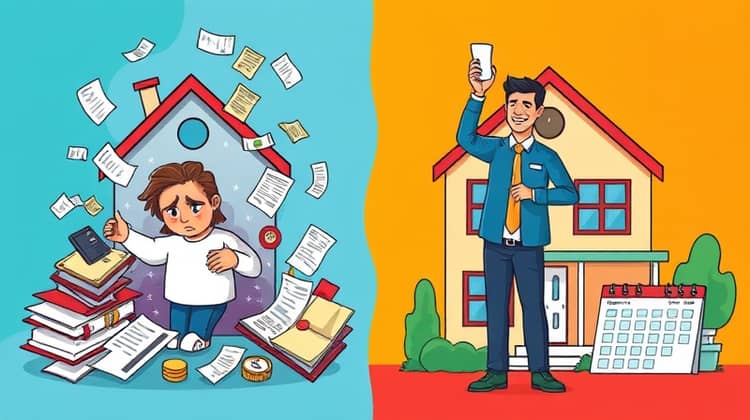Homeownership is a significant achievement, providing stability and a sense of community. However, economic uncertainties and personal financial challenges can sometimes lead individuals and families to the brink of foreclosure. Understanding the potential steps to avoid losing your home is crucial, and there are strategies that can help mitigate this crisis.
Foreclosure doesn't just affect your living situation; it impacts your credit, financial future, and emotional well-being. By adopting proactive measures and exploring available resources, homeowners can navigate financial difficulties more effectively.
1. Communicate with Your Lender

Open communication with your lender is fundamental in preventing foreclosure. Many homeowners make the mistake of avoiding contact when they face financial difficulties, assuming that silence will shield them from foreclosure proceedings. In reality, lenders often have options to assist you during tough times, but they can only help if they know your situation.
When you reach out, be honest about your financial challenges. Express your willingness to work out a solution that benefits both parties. Staying proactive can make a significant difference in the outcome.
- Inform your lender of your financial situation as soon as possible.
- Request information about any available loan modification programs.
- Ask about temporary forbearance options that would allow you to pause payments.
- Keep records of all communication and agreements with your lender.
Remember, your lender wants to avoid foreclosure as much as you do, as it is costly for them as well. By maintaining communication, you are taking the first step towards finding a solution.
2. Understand Your Mortgage

Understanding the terms of your mortgage is crucial for identifying potential avenues for avoiding foreclosure. Many homeowners do not fully comprehend their mortgage agreements, leading to situations where they feel trapped without options.
Take the time to read through your mortgage documents, focusing on the payment schedule, interest rate, and any contingencies that may apply. If you have questions, consider seeking help from a housing counselor or a trusted advisor.
- Identify the current balance of your mortgage and any penalties for late payments.
- Know your interest rate and whether it is fixed or adjustable.
- Assess any fees that may be applied to your mortgage.
- Understand the timeline and legal process associated with foreclosure in your state.
Being well-informed about your mortgage gives you the tools you need to make strategic decisions that could help you avoid foreclosure.
3. Loan Modification

Loan modification is a viable option for homeowners facing financial difficulties. This process involves the lender altering the terms of your existing mortgage to make the payments more manageable.
It can include lowering the interest rate, extending the loan term, or even changing the type of loan you have. While this can provide immediate relief, it is essential to understand the implications of a loan modification on your long-term financial situation.
- Gather your financial documents, including income statements and debts.
- Submit a formal request for loan modification to your lender.
- Follow up regularly with your lender about the status of your request.
- Be prepared to provide additional information or documentation as needed.
Keep in mind that not all lenders offer loan modifications, so you may need to explore multiple options to find a mortgage provider willing to work with you.
4. Refinancing

Refinancing involves obtaining a new mortgage to pay off your existing one, potentially at a lower interest rate. This can make monthly payments more affordable and free up cash for other expenses.
However, refinancing is not suitable for everyone, especially if your credit score has declined or if you have little equity in your home. Be sure to carefully weigh the costs and benefits before pursuing this option.
- Check your credit score and existing mortgage terms.
- Shop around for lenders offering favorable refinancing options.
- Submit applications to multiple lenders to compare offers.
- Choose the best refinancing option that fits your financial situation.
If done correctly, refinancing can provide the necessary relief to help you keep your home and regain financial stability.
5. Short Sale

A short sale occurs when a lender agrees to let you sell your home for less than what you owe on the mortgage. This can be an effective way to avoid foreclosure if maintaining your home is financially impossible. It allows you a cleaner exit from the mortgage without the negative implications of foreclosure.
Before pursuing this option, you will need to work closely with your lender to gain approval for the sale and ensure it is in your best financial interest.
- Consult a real estate professional to evaluate your property's market value.
- Get in touch with your lender to discuss short sale options.
- List your home and market it effectively to attract potential buyers.
- Negotiate with the lender to accept the sale proceeds as full satisfaction of the debt.
A successful short sale can alleviate the burden of an unmanageable mortgage while protecting your credit from the more severe consequences of a foreclosure.
6. Bankruptcy

Filing for bankruptcy may appear drastic, but it could be a suitable solution for some homeowners struggling with overwhelming debt. Bankruptcy can provide an automatic stay, which halts foreclosure proceedings temporarily while you reorganize your finances.
There are two main types of bankruptcy that individuals can consider: Chapter 7 and Chapter 13. Understanding the differences between them is vital to deciding which is the most appropriate route for your situation.
- Chapter 7 bankruptcy can eliminate unsecured debts but may require selling some assets.
- Chapter 13 bankruptcy allows you to keep your home and reorganize your payments over a period of time.
- Consult with a bankruptcy attorney to fully understand the potential outcomes.
It’s important to fully grasp the long-term consequences of bankruptcy on your credit and future financial opportunities before proceeding.
7. Housing Counseling

Seeking help from a housing counselor can be an essential step in avoiding foreclosure. These professionals are trained to offer guidance and resources tailored to your situation, helping you explore available options to manage your mortgage and finances.
Counseling can provide valuable insights into how to communicate effectively with lenders, understand your financial circumstances, and navigate the complexities of various foreclosure prevention strategies.
Conclusion

Avoiding foreclosure is a challenging journey but one that is possible with the right knowledge, strategies, and support. By staying proactive, communicating with your lender, and exploring the various avenues available, you can take charge of your financial future and work towards retaining your home.
Always remember to seek professional advice when necessary, and never hesitate to ask for help, as resources are available to assist you through difficult times.














